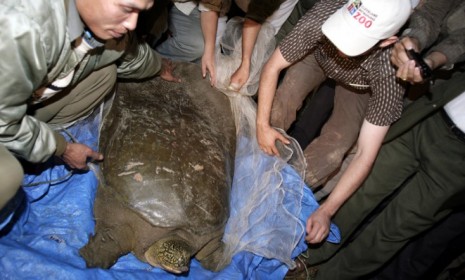Are the world's most endangered species even worth saving?
Conservationists might not bother rescuing a giant soft-shell turtle or a pygmy three-toed sloth because these animals don't provide any clear benefits to humans

A free daily email with the biggest news stories of the day – and the best features from TheWeek.com
You are now subscribed
Your newsletter sign-up was successful
How should humans decide which endangered animal species to focus on saving? That's the question being posed by an international coalition of scientists in a new paper documenting 100 of the world's most at-risk species. The scientists fear that these plants and animals are at the greatest risk of extinction because, quite simply, they don't offer any obvious or immediate benefit to humans. Here's what you should know:
Who is behind the report?
The report, Priceless or Worthless?, was published at the World Conservation Congress in South Korea. Some 8,000 scientists from all over the world put together the first-of-its-kind study for the meeting of the International Union for Conservation of Nature (IUCN), which convenes every four years.
The Week
Escape your echo chamber. Get the facts behind the news, plus analysis from multiple perspectives.

Sign up for The Week's Free Newsletters
From our morning news briefing to a weekly Good News Newsletter, get the best of The Week delivered directly to your inbox.
From our morning news briefing to a weekly Good News Newsletter, get the best of The Week delivered directly to your inbox.
What kinds of animals are on this list?
Take the pygmy three-toed sloth, which is "no bigger than a newborn baby" and is found exclusively on a single island off the coast of Panama, says Fiona Harvey at Britain's Guardian. Or take the willow blister, a parasitic fungus that grows on twigs in a tucked-away corner of Wales; it's the rarest type of fungus in the world. Then there's the Red River giant soft-shell turtle. Thanks to pollutants in the water and destruction of its habitat, there are only four left.
Why are these animals endangered?
First, the usual culprits: Habitat destruction, pollution, hunting, and climate change. But there's another problem: Unlike cuddly or "charismatic" endangered animals like pandas and tigers — or even the appetite-suppressing hoodia cactus, which has obvious medicinal uses — these endangered species are dangling precariously close to extinction because of the simple fact that they don't offer humans any clear benefits. In many cases, people don't care enough about these species to intervene.
A free daily email with the biggest news stories of the day – and the best features from TheWeek.com
So... what now?
The question remains: Are these species worth devoting limited resources to saving? "The donor community and conservation movement are increasingly leaning towards a 'what can nature do for us?' approach, where species and wild habitats are valued and prioritized according to these services they provided for people," says Jonathan Baillie, director of conservation for the Zoological Society of London. Well, saving every single species is an "enormous undertaking," says Sybille Klenzendorf of the World Wildlife Fund. It's often better to save "umbrella species like tigers, elephants, and rhinos" in order to protect the habitats they share with other endangered creatures. "We won't be able to save every species," says Cristian Samper, head of the New York-based Wildlife Conservation Society, "but if we are smart we can save many of them."
Sources: Daily Mail, Guardian, NBC News, The Register
-
 How the FCC’s ‘equal time’ rule works
How the FCC’s ‘equal time’ rule worksIn the Spotlight The law is at the heart of the Colbert-CBS conflict
-
 What is the endgame in the DHS shutdown?
What is the endgame in the DHS shutdown?Today’s Big Question Democrats want to rein in ICE’s immigration crackdown
-
 ‘Poor time management isn’t just an inconvenience’
‘Poor time management isn’t just an inconvenience’Instant Opinion Opinion, comment and editorials of the day
-
 The billionaires’ wealth tax: a catastrophe for California?
The billionaires’ wealth tax: a catastrophe for California?Talking Point Peter Thiel and Larry Page preparing to change state residency
-
 Bari Weiss’ ‘60 Minutes’ scandal is about more than one report
Bari Weiss’ ‘60 Minutes’ scandal is about more than one reportIN THE SPOTLIGHT By blocking an approved segment on a controversial prison holding US deportees in El Salvador, the editor-in-chief of CBS News has become the main story
-
 Has Zohran Mamdani shown the Democrats how to win again?
Has Zohran Mamdani shown the Democrats how to win again?Today’s Big Question New York City mayoral election touted as victory for left-wing populists but moderate centrist wins elsewhere present more complex path for Democratic Party
-
 Millions turn out for anti-Trump ‘No Kings’ rallies
Millions turn out for anti-Trump ‘No Kings’ ralliesSpeed Read An estimated 7 million people participated, 2 million more than at the first ‘No Kings’ protest in June
-
 Ghislaine Maxwell: angling for a Trump pardon
Ghislaine Maxwell: angling for a Trump pardonTalking Point Convicted sex trafficker's testimony could shed new light on president's links to Jeffrey Epstein
-
 The last words and final moments of 40 presidents
The last words and final moments of 40 presidentsThe Explainer Some are eloquent quotes worthy of the holders of the highest office in the nation, and others... aren't
-
 The JFK files: the truth at last?
The JFK files: the truth at last?In The Spotlight More than 64,000 previously classified documents relating the 1963 assassination of John F. Kennedy have been released by the Trump administration
-
 'Seriously, not literally': how should the world take Donald Trump?
'Seriously, not literally': how should the world take Donald Trump?Today's big question White House rhetoric and reality look likely to become increasingly blurred